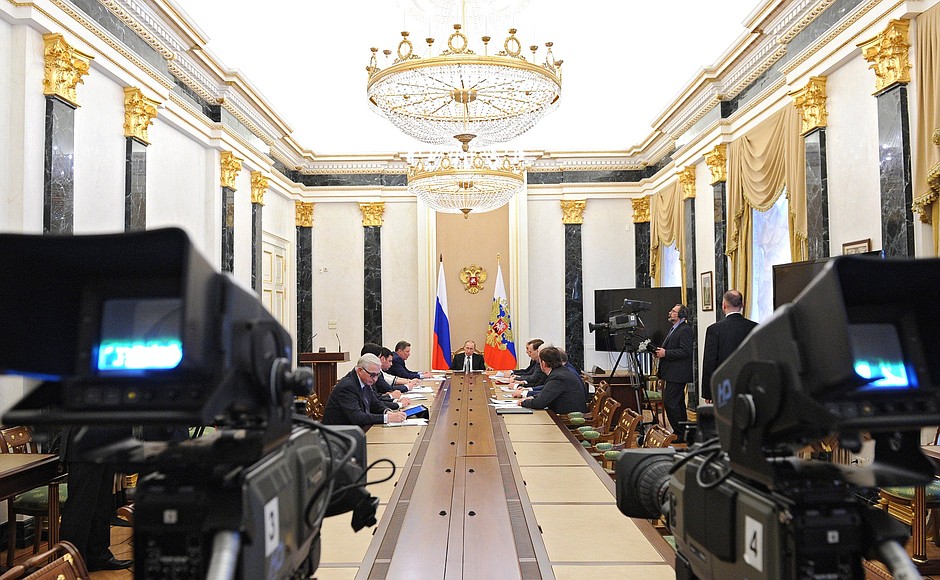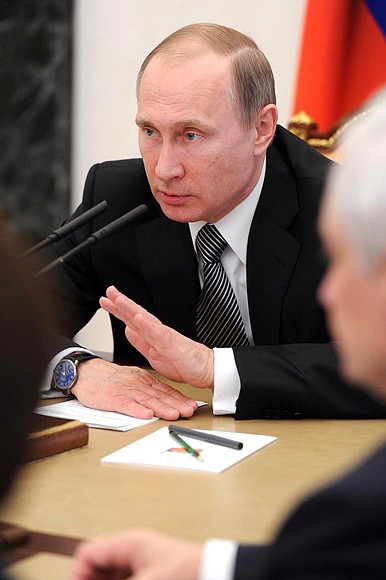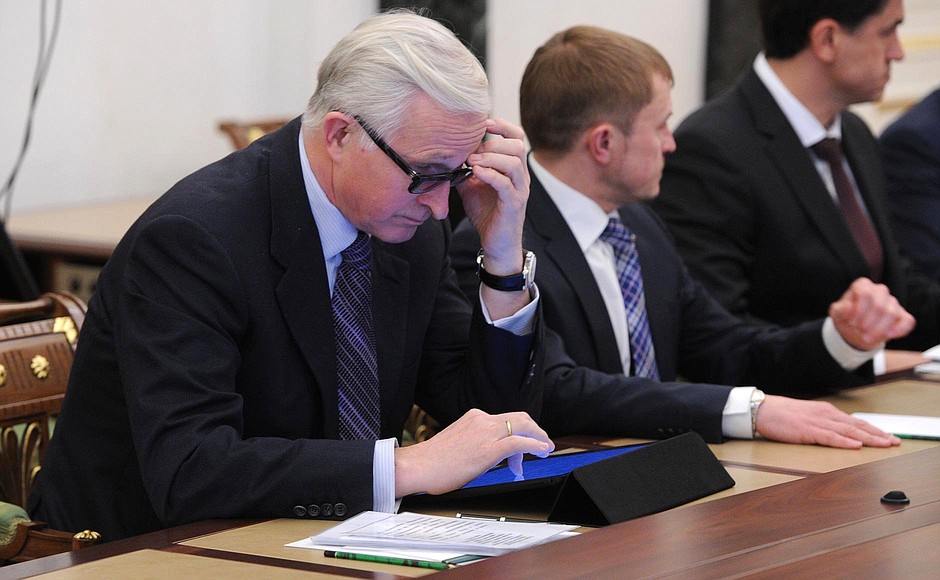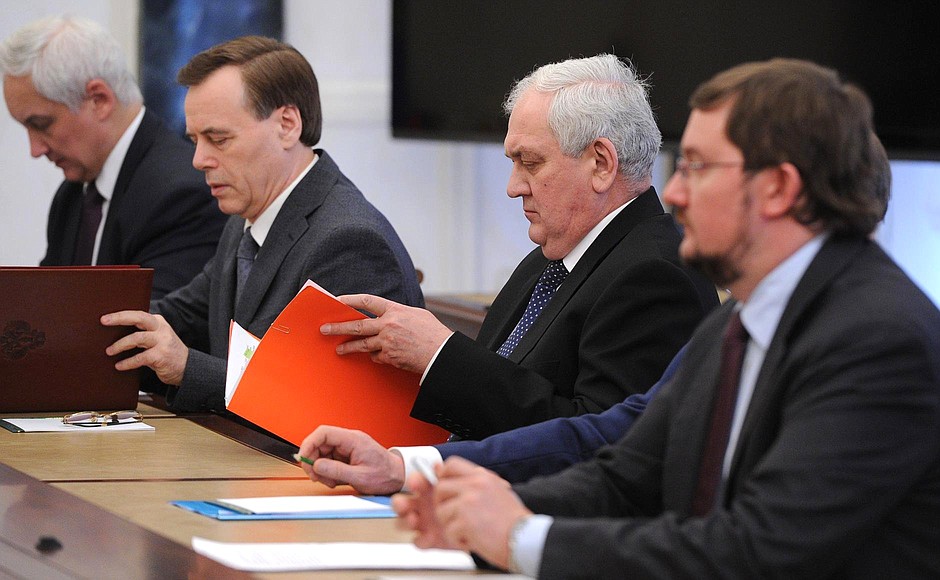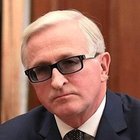The working group was formed in February 2016 to organise cooperation between business associations and the federal executive authorities. The group’s participants include the Presidential Executive Office, Interior Ministry, Investigative Committee and Prosecutor General’s Office, and also the country’s biggest business associations: the Chamber of Commerce and Industry, the Russian Union of Industrialists and Entrepreneurs, OPORA Russia, and Delovaya Rossiya.
* * *
President of Russia Vladimir Putin: Good afternoon, colleagues.
I meet regularly with business community representatives and with the heads of the various law enforcement agencies and security services. I hear various complaints from them in each other’s address, constantly, in fact.
Overall, we see that there are some conflicts. The law enforcement agencies protect the interests of our entire country and society, and this is their sacred duty. The businesspeople say that the law enforcement personnel exaggerate or overstep their powers and in so doing, destroy the positive business climate we have been working to build.
There is no question that this is certainly very important. Only by developing a favourable business climate can we hope to make our economy competitive and effective overall.
At my last meeting with Mr Shokhin [president of the Russian Union of Industrialists and Entrepreneurs], we agreed to establish this platform for analysing law enforcement practice in business. The business leaders have raised this matter on past occasions and spoken of the need for a platform that would enable both sides to meet and discuss the issues of respective concern.
Of course, as I said, the law enforcement agencies must protect the state’s interests, and it is no secret that there are corruption cases within the law enforcement agencies themselves. This is something we are fighting, and we will continue to do so, but there is no shortage of cases of the business community breaking the law too.
Our paramount task is to ensure that all citizens obey the law, no matter what their field of activity, no matter whether in law enforcement or business.
My position is that this platform and these meetings will not be used to lobby anyone or anything, but will concentrate on the sole task of analysing law enforcement practice and coming up with proposals in this important area to create a better environment and a balance of interests, including by improving existing laws. All of this work should be absolutely transparent and public. This is particularly important.
Today, we are holding the first meeting of this sort. I have instructed Sergei Ivanov [Chief of Staff of the Presidential Executive Office] to head the group, and Deputy Interior Minister Dmitry Mironov will be the secretary and responsible for routine work. I ask you to take this work very seriously and I am sure that if you do this on both sides, we can and will achieve positive results, as we have of late with the business initiative project, which has formulated tasks for improving laws and law enforcement practice in doing business.
I hope that these meetings will follow the same aim, without trying to act in place of the Prosecutor General’s Office or the watchdog agencies, but carrying out the important work of analysing the situation and improving our laws and regulations.
Mr Ivanov, you have the floor.
Chief of Staff of the Presidential Executive Office Sergei Ivanov: Mr President,
After you gave the instruction on February 16 to establish this working group, we held some preliminary meetings with representatives of the business community and the law enforcement agencies, with the Presidential Executive Office’s participation too, of course.
I want to note one matter of principal importance to start. All of the participants share the same understanding of the task: to make a real improvement in the business climate, prevent any attempts to use criminal prosecution as a means of putting pressure on business, unfair competition, and, as you mentioned in your Address [to the Federal Assembly], sometimes simply to seize assets.
We came to the conclusion that there are still quite a few obvious loopholes in the criminal and procedural law, creating opportunities for abuses to take place.
To cite one well-known example, the law enforcement officials open a criminal case against an entrepreneur and seize documents, hard disks, goods in stock and other material assets during the investigation. We do not know how long the law enforcement officials can keep these assets. The law does not clarify this and there is no regulation of any sort. In the meantime, the company essentially comes to a halt in such conditions and the business collapses or, let’s make no secret of it, is taken over by others. I think it would be good and proper to propose adjustments to the Criminal Procedural Code to clarify the amount of time that arrested assets can remain in this state, so that we do not end up with assets under arrest for three, five, or who knows how many years.
This next issue is liability for economic crimes. As you have said, we are not about to close our eyes to legal violations among the business community, but at the same time, punishment should be suitable and fair and should fit the severity of the crimes. In this respect, the logical question is which criteria should we use to assess the seriousness of economic crimes?
Mr President, this matter was already raised when you met with business community representatives. The law sets out the minimum threshold value of damage used to determine serious and especially serious crimes, but this is the issue I want to point out now: what exactly are serious and especially serious crimes in this area?
These threshold values, including for tax crimes, have not changed since the early 2000s, in around 12 years. But business turnover and the value of goods and services has grown many-fold over the last decade, with the result that it is now possible to open a criminal case against a businessperson for stealing 1,000 rubles. Businesspeople can end up getting several years in prison for what is really not a large sum of damage by today’s measure. Today, embezzlement of 250,000 rubles qualifies as a serious crime, and embezzlement of 1million as especially serious. Clearly, the threshold value of damage needs to be brought into line with today’s economic reality. This is a question we want to discuss at today’s meeting.
Regarding the forms and mechanisms for entrepreneurs’ liability, we cannot make it our aim to punish, send people to prison and put them behind bars in every case. If a businessperson has broken the law for the first time and has voluntarily repaid the damage to all victims, there are good reasons to free them from criminal punishment. In other words, if this is a first offence, and if the person has voluntarily compensated the damage to all concerned, and sometimes this can be hundreds of people or legal entities, this could be grounds for being freed from criminal penalties. This is the approach used now with regard to tax offences. I think it would be good to extend this approach to economic crimes too.
Another proposal that has come from the business community, from all of the business organisations, is to cement in law the right to have a notary be able to visit businesspeople in pre-trial detention centres so that while they are in custody, they can delegate the right to run the business or company. The main condition here is that the businessperson and notary have no chance to alienate or hide assets or money that should be confiscated in order to compensate the damage. This is something we must avoid at all costs, of course. But at the same time, the working group agrees with the business community that businesspeople should have the chance, within the law, to protect their business and ensure its normal operation while they are under arrest. This proposal has been made.
In conclusion, I also wanted to mention the notorious article 159.4 of the Criminal Code, “Fraud in business activity.” Business, especially small and medium-sized business, is always raising this question. I remind you that in the past, under this article’s provisions, businesspeople used to be punished less severely than ordinary people. But in 2014, the Constitutional Court ruled that these provisions violate the principle of equality of all citizens before the law and do not give the victims adequate protection. Of course, we must respect and obey the Constitutional Court’s decisions. The main thing here is to find a balance between ensuring the business community’s respect for the law and creating a favourable investment climate.
Businesspeople, legal entities accused of fraud, do often cause greater damage and harm than small-scale swindlers in terms of the sums involved and the number of victims. You do not need to look far for examples. It is enough to recall the directors of some banks, which essentially embezzled their depositors’ money. This is tremendous material damage.
But there is one substantial reservation here. In most cases when businesspeople are punished for fraud, in practice, they are punished simply for failing to fulfil their obligations fixed in contracts and agreements. There are many reasons for this, and it can be the case that they fail to meet their obligations not out of malicious intent, but due to particular circumstances that arose. For example, the market situation changed, competition increased, partners or subcontractors went bankrupt. If your subcontractors vanish, what do you do? But the blame falls on the concrete businessperson. Or, another common case, a businessperson makes a mistake, takes an unjustified risk, doesn’t anticipate the consequences, and ends up taking the blame. We therefore cannot always see in the same light businesspeople who have failed to meet their obligations for whatever reasons, and swindlers who deliberately set out to deceive, break the law, and often cause billions of rubles worth of damage to countless people.
The working group therefore thinks it good to differentiate threshold values in the article on fraud depending on the person who carried out the swindling, in other words, differentiate between those acting as private individuals, as individual entrepreneurs, or as representatives of a legal entity or of an organised group, which also happens.
These are the issues we will examine at today’s meeting. I propose that we discuss them, and then, if you agree, give the instruction to draw up draft amendments to the law in the relevant areas.
Vladimir Putin: Good.
<…>
